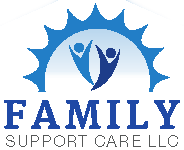After a stroke, life can change in an instant. Simple activities—like speaking clearly, remembering words, or eating safely—can suddenly become frustrating or even dangerous. For many families in Hamilton, Ohio, this stage of recovery is emotional and overwhelming.
That’s where in-home speech therapy comes in. At Family Support Care LLC, our licensed speech-language pathologists (SLPs) help stroke survivors rebuild communication skills, restore swallowing function, and regain confidence—all within the familiar comfort of home.
This article explains how speech therapy at home works, what to expect, and why it’s such a powerful part of the healing journey.
1. The Role of Speech Therapy in Stroke Recovery
A stroke can affect different areas of the brain, leading to a variety of speech and language challenges, such as:
-
Aphasia: Difficulty speaking or understanding words 🗣️
-
Dysarthria: Slurred or slow speech caused by muscle weakness
-
Apraxia: Trouble forming words due to disrupted brain signals
-
Dysphagia: Difficulty swallowing safely
Speech therapists address all of these issues by designing personalized treatment plans that target the specific areas impacted by the stroke.
For many Hamilton-area seniors, these services make communication possible again—turning frustration into progress.
2. The Comfort and Convenience of Home-Based Therapy
For stroke survivors, traveling to a clinic can be tiring and stressful—especially when mobility is limited. In-home therapy removes these barriers, allowing patients to focus entirely on healing.
Being at home also gives therapists the chance to work in real-life settings—like the kitchen, dining table, or family room—helping patients practice communication in familiar environments.
Family members can observe sessions, learn techniques, and support progress between visits. This creates a collaborative, encouraging atmosphere that speeds up recovery.
3. Improving Speech and Communication Skills
The primary goal of in-home speech therapy is to restore communication abilities so your loved one can express thoughts, feelings, and needs again.
Therapists use a mix of evidence-based techniques, including:
-
Articulation exercises to strengthen muscles used for speech
-
Language drills to rebuild vocabulary and sentence structure
-
Conversational practice to improve real-world communication
-
Memory and cognitive games to support brain recovery
Over time, patients gain confidence and independence in conversations—whether that’s talking with a spouse, answering the phone, or engaging with friends.
4. Restoring Swallowing Function and Safety
Difficulty swallowing (dysphagia) is common after a stroke and can lead to serious health risks, including choking or aspiration pneumonia.
Speech therapists conduct swallowing evaluations and develop customized strategies to make eating safe again. This may include:
-
Teaching safe swallowing techniques 🥄
-
Adjusting food textures and fluid consistency 🥣
-
Strengthening oral muscles through targeted exercises 💪
-
Collaborating with nurses and caregivers on meal plans 🍽️
These interventions help patients enjoy meals again—without fear or discomfort.
5. Supporting Cognitive and Memory Skills
Stroke recovery isn’t just about speech—it’s also about thinking, memory, and problem-solving. Many patients struggle with recalling words, managing daily tasks, or focusing for long periods.
Speech therapy can help rebuild these cognitive functions through structured activities such as:
-
Word recall games
-
Sequencing and organization tasks
-
Memory-building exercises
-
Attention and focus drills
These exercises don’t just restore communication—they rebuild confidence and independence in daily life.
6. Emotional Healing Through Connection
Losing the ability to communicate can be deeply isolating. Many stroke survivors feel frustration or sadness when words don’t come easily.
At Family Support Care LLC, our therapists understand that recovery is emotional as much as physical. We create a supportive, patient-centered environment where every small victory is celebrated.
Regaining speech means regaining connection—with family, friends, and the world. 💬❤️
7. Collaboration with the Home Health Team
In-home speech therapy doesn’t exist in a vacuum—it’s part of a coordinated care plan.
Our SLPs work closely with skilled nurses, occupational therapists, and physical therapists to ensure holistic recovery. For example:
-
The nurse monitors medications that may affect swallowing.
-
The OT ensures safe eating environments.
-
The PT improves posture for better breathing and speech.
This teamwork ensures your loved one’s care is complete, cohesive, and consistent across services.
8. Family Involvement and Education
Families play a huge role in recovery. Our therapists teach practical communication strategies you can use every day, such as:
-
Asking yes/no questions to reduce frustration
-
Using written notes or gestures when needed
-
Encouraging conversation without rushing responses
When families understand how to support therapy, progress accelerates—and patients feel empowered by a strong support system.
9. Real Results for Hamilton Families
Across Hamilton and Butler County, our patients are rediscovering their voices, enjoying mealtimes again, and reconnecting with loved ones.
One local client who suffered a stroke regained full conversational ability after months of home-based therapy—without ever needing to travel to a clinic. These success stories are what fuel our passion for providing compassionate, local care.
10. Coverage and Access
Most Medicare and insurance plans cover speech therapy when prescribed by a physician as part of stroke rehabilitation or cognitive recovery.
Our team helps coordinate with doctors, verify coverage, and schedule visits around your family’s needs. We proudly serve Hamilton and surrounding Southwest Ohio counties, bringing quality therapy right to your doorstep.
Conclusion
Recovery after a stroke takes time, patience, and expert support—but no one has to face it alone. With in-home speech therapy, your loved one can rebuild communication, regain swallowing function, and rediscover independence—all from the comfort of home.
📞 Contact Family Support Care LLC today to schedule a personalized evaluation and start your loved one’s recovery journey in Hamilton, Ohio. Together, we’ll turn progress into possibility. 💙
Would you like me to move ahead with Post #7: “The Role of a Medical Social Worker in Home Health Care in Hamilton, Ohio”?

